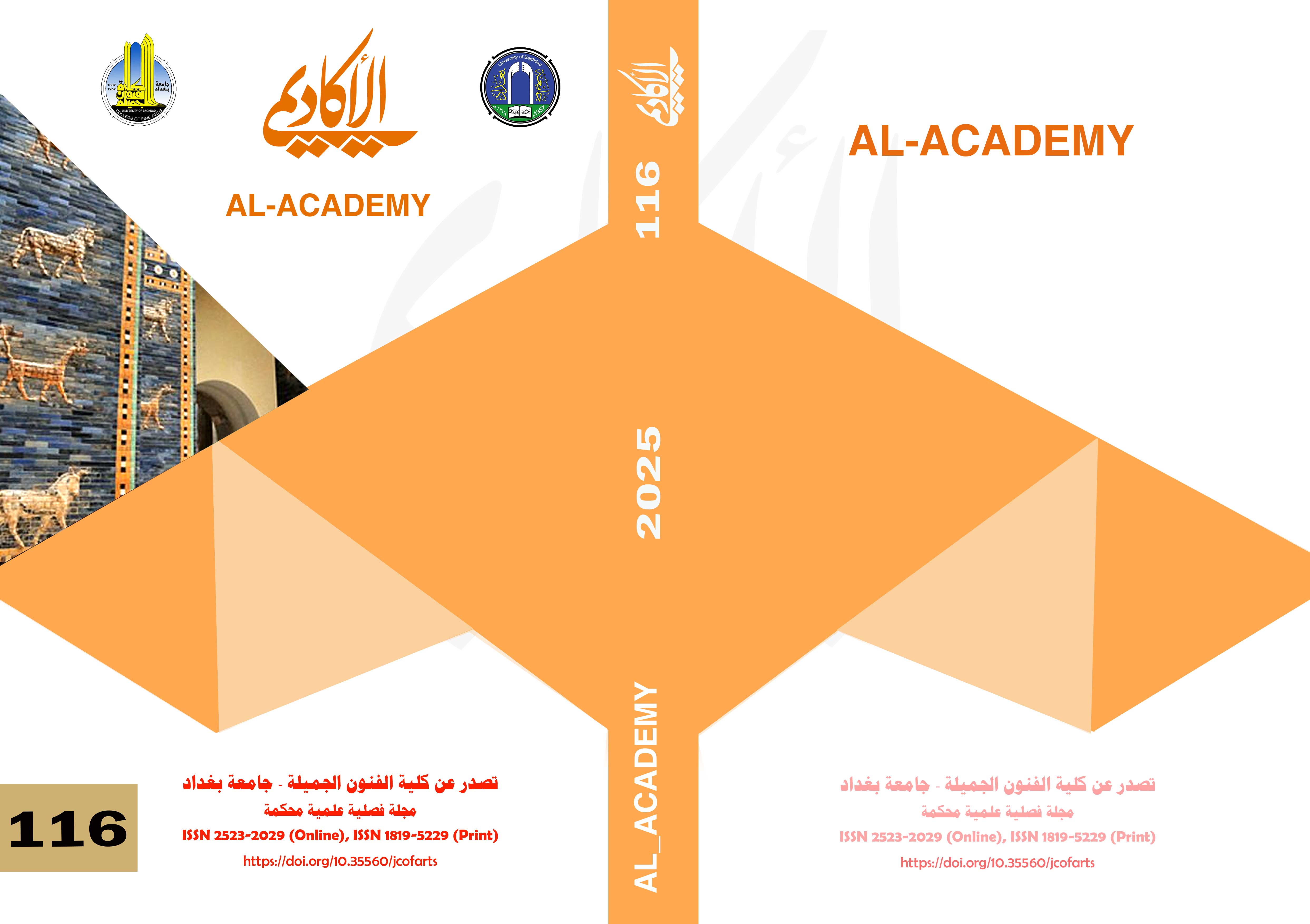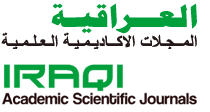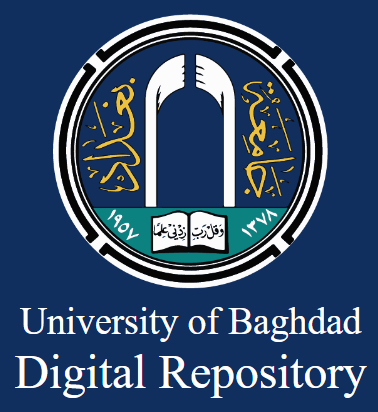The role of Museums in Displaying and Re-defining the Decorative Products of Islamic Art Using Technology and Artificial Intelligence
DOI:
https://doi.org/10.35560/jcofarts1539Keywords:
Islamic arts, applied arts, decorations and techniques, art museums, Louvre MuseumAbstract
Islamic art decorations are a fertile source of art and science. Islamic art has touched on several fields of applied arts such as pottery, ceramics, glass, metals, textiles, and wood. Museums play a role in highlighting the heritage of Islamic art in various artistic styles, which can be highlighted in the educational process in universities as well as helping artists understand various Islamic artworks. This research aims to identify the section dedicated to Islamic arts at the Louvre Museum in Paris (France) in October 2022. The research followed the descriptive analytical approach using various tools to collect information, namely field visits, observation cards, photography, video clips, illustrations, the use of technology tools and artificial intelligence. The most important results resulted in analyzing nine works of art pieces with different techniques from Islamic arts and documenting them with digital images and analyzing them using modern technologies, which helps the researcher classify the artwork in terms of the style of the Islamic era, the type of artwork, the structural and decorative design, the type of decoration, the type of material or technique used, its different colors, the city to which it belongs and the year if any.
References
Al-Anbaky, A. (2020). Handicrafts in Mamluk Egypt. IKLIL Journal of Humanities, 1(3), 107-
134.ISSN ONLINE:9570-2707.
Abd Al-Ameer, W . &Abd Al-Ameer, A.(2015). Aesthetic values of the decorations
a. heterogeneities in Islamic architecture. Al-Academy Journal,73, 237- 262. https://doi.org/10.35560/jcofarts73/237-262
Abdul Majeed, M. (2024). The aesthetic dimensions of decorative design inspired by Islamic art
a. as a source for contemporary decorative design. Journal of Qualitative Education Research, 2024(83), 1143-1214. doi: 10.21608/mbse.2024.290894.1476
Abbad, M. (2024). Basic museum functions, their development, and their
a. impact on the diversity and development of the museum concept. Al-Qalaa Journal, (22), 48-84.
Abdel Tawab, R., Zahran, G., & Makkawi, M. (2021). Arabic calligraphy and its employment in
a. Islamic and contemporary architecture. Journal of Heritage and Design, 1(3), 104-123. https://doi.org/10.21608/jsos.2021.150998
Abdel Hamid, A. Ali, Salama, & Desouky, A. (2014). An analytical study of some Umayyad
decorative elements in Egypt and the Levant. Journal of Qualitative Education Research,
2014(34), 423-446. doi: 10.21608/mbse.2014.141372
Al-Hadithi, H. & Daham, S. (2023). Saudi Sadu Art as an Introduction to Producing Digital
Works Using Procreate. Journal of Arts, Literature, Humanities and Social Sciences, (98),
274-287. https://doi.org/10.33193/JALHSS.98.2023.956
Al-Awadhi, N. & Marjouna, I. (2024). The development of Islamic arts and their impact on
a. producing soft power in the Abbasid era. Humanities, 2024(62), 447-466. https://doi.org/10.21608/ins.2024.351698
AlAbidi, K.(2006). Pottery in the Abbasid era from the first century to the seventh
a. century. Al-Academy Journal,45,115-154.
b. https://jcofarts.uobaghdad.edu.iq/index.php/jcofarts/article/view/938
Al-Essa, A. (2019). Formal formulations of popular decorative units in the Kingdom of Saudi
a. Arabia inspired by Islamic decorations and their use in enriching the design and implementation of contemporary artistic work. Journal of Architecture, Arts and Humanities, 4(15), 368-387. doi:10.21608/MJAF.2019.11607.1092
Alkandari, F. (2025).Designing ceramics inspired by Islamic geometric patterns using artificial
intelligence using Microsoft Copilot intelligence using Microsoft Copilot.
a. Journal of Qualitative Education Research, 2025(90), 29-52. https://doi.org/10.21608/mbse.2025.347565.1572
Al-Najjar, M. Abdel Fattah, H, & Al-Hawwal, K. (2014). An Analytical Study of Selected
a. Motifs Of Islamic Art in The Fatimid Era and Benefit From Them In The Work Of Lighting Units Contemporary Ceramic. Journal of Qualitative Education Research, 2014(33), 1255-1284.https://doi.org/10.21608/mbse.2014.143567
Al-Mobar, J. (2014). Decorative Elements in Islamic Arts. Arts and Sciences, Al-Khums .
a. Journal of Humanities, Issue 8, 56-69. Retrieved from http://search.mandumah.com/Record/778686
Alsaggar, M., & AL-Qudahn, R. (2024). Methods and Techniques of Display at the Jordanian
a. National Museum of Fine Arts and its Role in Documenting Artistic Identity: A comparative Study. Jordan Journal of the Arts, 17(3), 291–312. Retrieved from https://jja.yu.edu.jo/index.php/jja/article/view/449
Al-Sarraj, H. (2016). Characteristics of Islamic Art. International Journal of Islamic Economics,
Vol. 2016, No. 54, pp. 77-82. https://search.emarefa.net/detail/BIM-747445.
Ali, Nahla. (2023). Artificial intelligence as one of its technical tools in advertising design as a
a. source of creativity and inspiration. The International Arab Journal of Digital Art and Design, 2(3), 143-167. doi: 10.21608/iajadd.2023.200915.1047
Anbar, M. (2024). The Impact of AI-Powered Platforms and Tools on Architectural Education.
a. Journal of Architecture, Arts and Humanities, (), -. doi: 10.21608/mjaf.2024.259661.3306
Amara, A., Hadi, H., & Morsi, R. (2022). A Study of the Aesthetics of Plant Decorations in
Ottoman Ceramics to Innovate Contemporary Designs for Textile Printing. Journal of
Architecture, Arts and Humanities, 7(33), 486-514. doi: 10.21608/mjaf.2020.49382.2054
Araqeeb,H., Rushdi,M., Mohamed,W., &El-Enany, S. (2012). The effect of ceramic body type
a. on crystalline glaze. Journal of Qualitative Education Research, 2012(25), 691-710. doi: 10.21608/mbse.2012.145559
El Gindy, M., Abdel Aziz, O., & Daoud, D. E. (2022). Simulation of Islamic Ceramics Using
Different Firing Techniques. Journal of Architecture, Arts, and Humanities, 7(34), 383-
395. doi: 10.21608/mjaf.2021.53489.2122
Hassan, S. (2024). Drawing animals and birds and the development of their appearance in
Islamic miniatures. Journal of Heritage and Design, 4(22), 208-227. doi:
10.21608/jsos.2023.197769.1379.
Hadi, A. L. ., & Angraeni, S. (2024). Integration of Scouting Methods and Islamic Arts:
a. Realizing the Student Profile of Pancasila Through Geometry Learning. Jurnal Amal Pendidikan, 5(1), 30–39. https://doi.org/10.36709/japend.v5i1.105
Hörmann-Shahidipour, S. (2021, June). The Influence of New Annex's Development on Historic
a. Urban Spaces; an Example of Louver Museum Square. In Proceedings of the International Conference of Contemporary Affairs in Architecture and Urbanism-ICCAUA (Vol. 4, No. 1, pp. 498-505).
Hamza, A. Hameed, S.(2023).The aesthetics of the sculptural formulations of swords in the Al-
Kafeel Museum of Treasures and Manuscripts. Al-Academy Journal,
37-52. https://doi.org/10.35560/jcofarts1209
Hajjaj, M, & Ali, S. (2024). Enjoying the New Identity of Fashion Designers in Egypt: Artificial
a. Intelligence Technology as a Design Assistance Tool. Preserving the Identity of Fashion Designers and Using Artificial Intelligence Technology as a Design Assistance Tool. Scientific Journal of Specific Education Sciences, 20(20), 278-348. doi: 10.21608/sjsep.2024.316517.1142
Ibrahim, M., Rushdi, A., &Mohamed, W. (2012). Getting glazes from Green argil soil in
a. enriching the ceramic surface. Journal of Qualitative Education Research, 2012(25), 751-769. doi:10.21608/mbse.2012.145570
Ibrahim, A & Al-Ghamdi, G. (2014). Creating new designs from Ottoman era decorations using
a. image processing software to enrich clothing accessories. Journal of Qualitative Education Research, 2014(33), 909-943. doi: 10.21608/mbse.2013.143551
Ibrahim, S. (2013). Sculpting Elements in Islamic Art. Journal of Qualitative Education Research,
2013(31), 769-803. doi: 10.21608/mbse.2013.145953
Image Color Picker.(n.d). Figma. https://www.figma.com/color-picker/
Mostafa, S.(2024). Drawing animals and birds and their evolution in Islamic miniatures.
a. Heritage & design Journal, l4, 22 . doi: 10.21608/JSOS.2023.197769.1379
Mohammed, H. &Al-Hassoun, A. (2017). Enriching the decorative design of women's clothing
a. accessories by integrating Kufic script and arabesque decorations using computers. Scientific Journal of Specific Education Sciences, 5(5), 364-405. doi:10.21608/sjsep.2017.166110
Muhammad, R. (2015). Islamic Decorative Arts. Al-Ma'rifah, Vol. 54, No. 618, 192-201.
Retrieved from http://search.mandumah.com/Record/690308
Makdashi, Ghazi. (1992). Aesthetics of Islamic Arts. Arab Thought, Vol. 13, No. 67, 6-37.
a. Retrieved from http://search.mandumah.com/Record/265448
Nasiri, S., & Sarvdalir, A. R. (2024). Geometrical Origin of Generative Shape Grammars for
a. Islamic Tectonics: Chapireh: The Transforming Element from Cubic Chambers to Spheric Domes. Nexus Network Journal, 26(1), 177-195. doi.org/10.1007/s00004-023-00743-y
Nada, M.(2016). Symbolism in Geometrical Islamic Ornaments and its Impact on Contemporary
a. Poster Design. Journal of Architecture, Arts and Humanities, Issue 4, 210-235. Retrieved from http://search.mandumah.com/Record/925139
Okasha, H.(2016). Islamic arts as an insipration source for garments’ printing designs according
a. the international fashion trends. Arab Association for Islamic Civilization and Art, 16, (1), 3, 273-289. doi:10.12816/0036566
Oksanen, A., Cvetkovic, A., Akin, N., Latikka, R., Bergdahl, J., Chen, Y., & Savela, N. (2023).
a. Artificial intelligence in fine arts: A systematic review of empirical research. Computers in Human Behavior: Artificial Humans, 1(2), 100004
PromeAI. (n.d). https://www.promeai.pro/ai-image-generation
Procreate. )2025(. https://procreate.com
Siyamto, M. R. R., Rhain, A., Ilham, M., & Wakit, S. (2025). Public Reception of Qur'an
a. Calligraphy at the Iska Mayang Grand Mosque in Sukoharjo. QiST: Journal of Quran and Tafseer Studies, 4(1), 23-40.doi:10.23917/qist.v4i1.7866
Sheik el Arab, A.(2024).Museum tresures for all: The role of museum curators in public
a. communication. Qatar University Press. http://hdl.handle.net/10576/54787
Shahib, R.(2018).Clay techniques and their use in Iraqi ceramics. DIRASAT TARBAWIYA,
a. 11(44),240-219, Supplement.
Thomas Thiemeyer,T.(2020). What kinds of museums for what kinds of societies? , ICOFOM
a. Study Series, 48-2 | 2020, 225-234. https://doi.org/10.4000/iss.2832
Tawfik, M., & Abdel Latif,A. (2017). Museums and their role in spreading tourism culture and
a. attracting tourists to Egypt - A study on the Egyptian Museum. International Journal of Heritage, Tourism and Hospitality, 11(2), 141-168. doi: 10.21608/jihtha.2017.28084
Turkistani, H. (2014). Documentation and its role in highlighting the history of heritage pieces.
a. Journal of Qualitative Education Research, 2014(35), 417-446. doi:10.21608/mbse.2014.141075
Wafi, A. (1972). Foliage is one of the masterpieces of Islamic arts. Islamic Awareness, Vol. 8,
a. No. 94, 60-70. http://search.mandumah.com/Record/440392.
Yeboah, D., Osei-Wusu, F., Asiedu, W., Asante, G., Antwi, E. S., Muntanka, S. A., ... &
Olowookere, G. (2025). A Framework for Intelligent Color Processing and Design
Optimization in UI/UX Systems.
Zakaria, Maryam. (2023). The Effectiveness of Digitization and Artificial Intelligence
a. Applications in Developing Art Education Curricula. Journal of the Faculty of Education (Assiut), 39(10), 520-539. doi: 10.21608/mfes.2023.328716
Zitran, S. (2016). Islamic arts (its characteristics, principles and elements). Islamic Studies,
a. Vol. 11, No. 2, 41-54. Retrieved from http://search.mandumah.com/Record/1246277
Downloads
Published
Issue
Section
License
Copyright (c) 2024 Dr.Nouf Alsuwaida

This work is licensed under a Creative Commons Attribution 4.0 International License.













